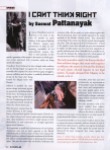By Saswat Pattanayak
Laxman Chaudhury’s arrest in Orissa is the latest in the series of assaults on press freedom. In the guise of fighting the Maoists, various state governments in India are now harassing journalists in an unprecedented manner. But what is more peculiar in this specific oppression of the people is the manner in which grassroot scribes associated with vernacular media are being specifically targeted.
Chaudhury from Mohana has been charged under sedition and for having waged war against the state. A committed journalist who exposed the nexus between ganja smugglers, women traffickers and the police, is suddenly declared as an enemy of the State after being framed for alleged links with Maoists. OTV reporters Khusiram Sunani and Kirti Chandra Sahu, editor of Nissan, Lenin Ray, Samaj correspondent Jagannath Bastia, Aaromv reporters Sriharsha Mishra and Kiran Mishra are also instances of journalists being harassed under similar pretexts.
Sedition is possibly the most serious charge envisioned against an unpatriotic and disloyal subject of the State. To bring up such a charge against active journalists who are championing the voice of the underrepresented clouds the vision of a vibrant democracy. Not only are the charges of sedition inappropriate to be brought against any journalist who advances the voices of dissent, but the very code of sedition needs to be reevaluated, and subsequently purged from the legal paraphernalia.
We need to remember that the original Section 124A of the Indian Penal Code (1870) defined Sedition thus: Whoever, by words, either spoken or written, or by signs, or by visible representation, or otherwise, brings or attempts to bring into hatred or contempt, or excites or attempts to excite disaffection towards Her Majesty or the Crown Representative in British India or British Burma shall be punished with transportation for life or any shorter term, to which fine may be added, or with imprisonment which may extend to three years, to which fine may be added, or with fine.
Conveniently enough, our judiciary and legislative power combines have not amended this section much, and have merely replaced “Her Majesty or the Crown Representative” with “the Government established by law”, “British India/Burma” with “India”, and the “transportation for life” with “imprisonment for life”. What has entirely gone amiss from juridical interventions is the need to rethink the absolutely abominable colonial strategies to continue enslaving human subjects in the name of loyalty to the ruling structure. Its utter disgusting to sustain such a tradition of oppression even to this date, let alone fabricate freethinking conscientious journalists into submitting to charges of so-called sedition.
What has gone missing from the critical discourse is the unique history of humankind against colonial empires. Had the unfree subjects obeyed such unjust legal systems enforced upon them, there would have never been a single instance of civil disobedience or non-cooperation, or outright opposition against social injustice. It is important to recall that revolutionaries of our freedom movements were not so much opposed to the British individuals per se. In fact, many of them were educated by British professors, admired rationalist traditions of the British, and joined internationalist forces in declaring their freedom rights. This was the reason why our leaders, moderates and extremists alike, did not prefer to incite violence against the British individuals. They were chiefly opposed to the unjust methods of the British colonial system. They demanded overhauling of the system, but did not preach hatred against the rulers. This is the approach of the revolutionaries – to heed to the peoples‘ causes and calls and stir up a new movement to replace an older unjust one. It is not mere opposition to specific political parties that is desirable for a journalist to air, but also the demand for replacement of a whole gamut of corrupt structure when it has failed its entire purpose.
Journalists, more than any other professionals, are representatives of the people’s voices. It is through their views and interpretations that some people aspire to be politicians, some administrators look for policy changes, and some judges inform themselves before releasing a verdict.
Not only journalists need to be forever shielded from sedition charges, they must work together to influence the masses to demand for abolition of such unjust colonial legacies in our legal system. If people demand Her Majesty to be ousted, so be it. And if the majority of India, impoverished in poverty and being penalized for being poor, demand the existing government – elected through fraudulent methods of indoctrination, money power and manipulations – to go, so be it.
If a grassroot journalist can be accused of sedition, then its time to reassess the executive-legislative-judiciary branches in view of their former colonial masters, and they must together be declared guilty of graver charges. Crimes against the people must be denounced far more stringently than crimes against the authorities.


1 comment » Write a comment